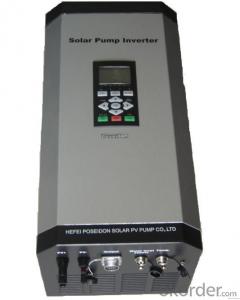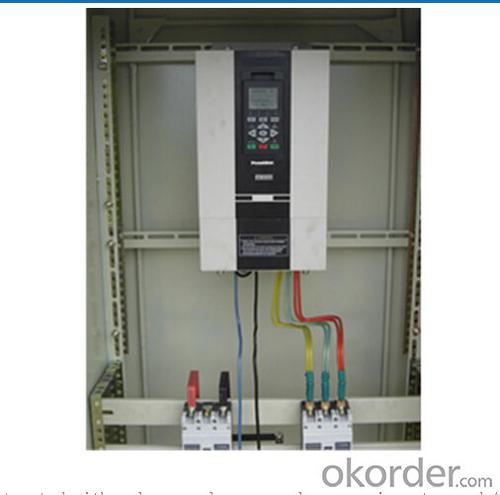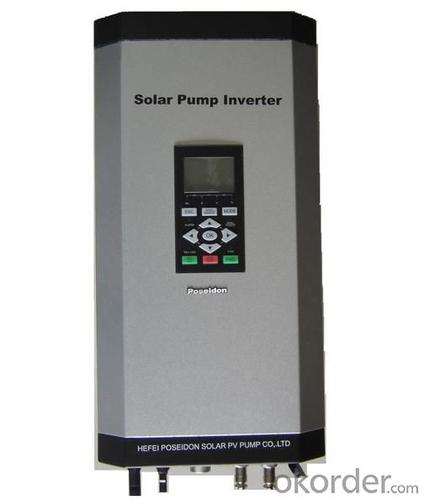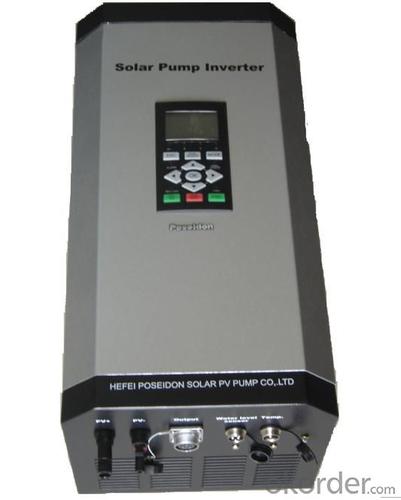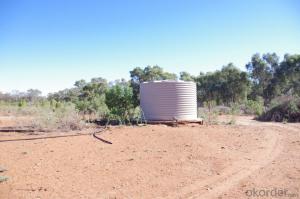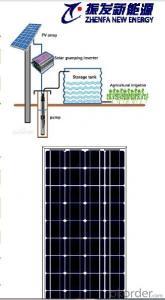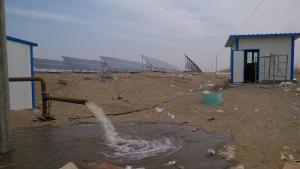Solar Pump for Well FCPM55KH Inverter
- Loading Port:
- China Main Port
- Payment Terms:
- TT OR LC
- Min Order Qty:
- -
- Supply Capability:
- -
OKorder Service Pledge
Quality Product, Order Online Tracking, Timely Delivery
OKorder Financial Service
Credit Rating, Credit Services, Credit Purchasing
You Might Also Like
Solar pump inverter FCPM55KH Product Description:
Solar water pumping system is constructed with solar panel array,solar pump inverter and AC water pump, DC current produced from solar panel will be delivered to solar pump inverter,and it will convert it into AC current to drive water pump,and will automatically regulate output frequency according to sun radiance intensity,maximally realize MPPT tracking function.
Features
Adopting the proposed dynamic VI maximum power point tracking (MPPT) control method, with fast response, and reliable operation, achieves efficiency of 99%.
Designed with variable frequency driver, greatly improves efficiency
Extremely high efficiency
Digital mode control, with automatic operation and manual operation mode options
Complete protection functions
Adopts intelligent IPM module, with high reliability
LCD display and operation panel, in real time presents operating data
Optional for water level measurement and control circuit
Applicable for general ACC pumps, like centrifugal pump, piston pump etc.
Independent intellectual property; Highly effective, the redundant reliability, exempts the maintenance and the long life.
The pumps are soft started, fully protected.
No batteries are used. So better Sunlight, more water.
Datasheet.
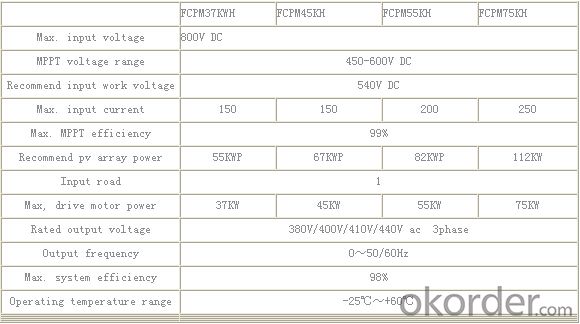
- Q: Can solar pumps be used for water supply in mining or quarrying operations?
- Yes, solar pumps can be used for water supply in mining or quarrying operations. Solar pumps are a sustainable and cost-effective solution that can provide reliable water supply for various industrial activities, including mining and quarrying. They can effectively extract water from underground sources or nearby water bodies, reducing dependence on traditional energy sources and minimizing the environmental impact. Additionally, solar pumps require minimal maintenance and have a long lifespan, making them suitable for remote and challenging mining or quarrying sites.
- Q: Can a solar pump be used for water supply in off-grid islands?
- Yes, a solar pump can be used for water supply in off-grid islands. Solar pumps are an ideal solution for remote areas where access to electricity is limited or non-existent. By harnessing solar energy, these pumps can effectively draw water from wells, rivers, or other water sources, providing a reliable and sustainable water supply. They are cost-effective, environmentally friendly, and can operate independently without the need for grid connectivity, making them well-suited for off-grid islands.
- Q: What is the expected maintenance cost for a solar pump system?
- The maintenance cost for a solar pump system can differ based on various factors such as system size, equipment quality, and local environmental conditions. However, solar pump systems generally require less maintenance compared to traditional diesel or electric pumps. Typically, regular inspections and cleanings are the primary maintenance tasks for a solar pump system. This includes checking the solar panels for dirt or debris that may reduce efficiency, inspecting the pump and control system for signs of wear or damage, and ensuring proper alignment and optimal functioning. In addition, it is important to regularly monitor and maintain the battery bank if energy storage is included in the system. This involves checking battery levels, ensuring proper charging and discharging cycles, and replacing worn-out batteries as necessary. Regarding cost, the expected maintenance expenses for a solar pump system are relatively low. Most maintenance tasks can be done by the system owner or a qualified technician, eliminating the need for expensive professional services. The cost mainly involves routine inspections, occasional part replacements, and cleaning supplies. It is advisable to allocate approximately 1-2% of the initial cost of the solar pump system per year for maintenance expenses. However, this estimate may vary depending on the specific circumstances, so it is recommended to consult with a solar pump system provider or an experienced technician for a more accurate assessment based on your specific installation.
- Q: How does the installation of a solar pump affect property value?
- Property value can be positively impacted by the installation of a solar pump. A solar pump offers a cost-effective and environmentally friendly alternative to traditional water pumps that rely on electricity or fuel. By utilizing solar energy, it reduces energy expenses and provides a sustainable power source for water pumping. Homeowners and property buyers who prioritize reducing their carbon footprint and saving money on utility bills are increasingly embracing solar technology. Consequently, properties equipped with solar pumps are often viewed as more attractive and can attract potential buyers who value sustainability and energy efficiency. Furthermore, the installation of a solar pump can enhance the overall value of a property by enhancing its self-sufficiency and resilience. In areas where access to electricity is unreliable or costly, a solar pump guarantees a dependable water supply regardless of power outages or fluctuating energy prices. In addition, the installation of a solar pump can indirectly benefit property value. For example, a property with a solar pump is likely to have a well-maintained water system, crucial for agricultural properties or those in rural areas. This can increase the property's appeal to potential buyers who rely on a consistent water supply for farming, gardening, or other water-dependent activities. However, it is important to consider that the impact on property value may vary based on factors such as location, market trends, and the overall attractiveness of the property. Property owners should also weigh the initial cost of installing a solar pump against the potential increase in property value. In conclusion, the installation of a solar pump can have a positive effect on property value by promoting sustainability, energy efficiency, and resilience. It can attract environmentally conscious buyers and increase the property's desirability for those dependent on a reliable water supply. Nevertheless, the impact on property value should be considered in relation to local market conditions, and the costs and benefits should be carefully evaluated before making a decision.
- Q: Can a solar pump be used for water supply in off-grid cabins?
- Yes, a solar pump can be used for water supply in off-grid cabins. Solar pumps are a reliable and sustainable option for providing water in remote locations where there is no access to the electrical grid. They harness energy from the sun and use it to power the pump, allowing for a constant supply of water without the need for traditional electricity sources. This makes them an ideal choice for off-grid cabins that rely on alternative energy sources.
- Q: Are there any limitations on the distance water can be pumped with a solar pump?
- Yes, there are limitations on the distance water can be pumped with a solar pump. The maximum distance depends on various factors such as the power of the solar pump, the elevation change, the diameter and length of the pipe, and the friction losses in the system. Generally, solar pumps have a maximum pumping distance of a few hundred meters, but this can vary depending on specific conditions.
- Q: How does a solar pump handle water with high levels of manganese?
- A solar pump can handle water with high levels of manganese by using a filtration system specifically designed to remove or reduce the manganese content. This filtration process helps ensure that the water pumped by the solar pump is free from high levels of manganese, making it safe and suitable for various applications.
- Q: Can a solar pump be used in conjunction with a traditional electric pump?
- A traditional electric pump can be used in conjunction with a solar pump, resulting in various advantages. The solar pump operates by utilizing solar energy, making it both cost-effective and environmentally friendly. During daylight hours, when the sun is shining, the solar pump can pump water, reducing the reliance on traditional electric pumps that consume electricity from the grid. To ensure a continuous water supply throughout the day and night, one can switch to a traditional electric pump when the sun sets after utilizing the solar pump during the day. This combination is especially beneficial in off-grid or remote areas where electricity access may be limited. Moreover, using a solar pump aids in reducing electricity bills and dependence on fossil fuels. In summary, integrating a solar pump with a traditional electric pump offers a dependable and sustainable solution for water pumping.
- Q: Can a solar pump be used for water supply in schools or public buildings?
- Yes, a solar pump can be used for water supply in schools or public buildings. Solar pumps are cost-effective, environmentally friendly, and can provide a reliable and sustainable source of water. They can be installed in areas where electricity supply is limited or unreliable, and can effectively meet the water needs of schools and public buildings.
- Q: Can a solar pump be used for water supply in remote agricultural farms?
- Yes, a solar pump can be used for water supply in remote agricultural farms. Solar pumps are an efficient and sustainable solution for providing water to remote areas where electricity access is limited. They can draw water from wells, rivers, or lakes using solar energy, making them an ideal choice for off-grid agricultural farms. Additionally, solar pumps require minimal maintenance and have a long lifespan, making them a cost-effective and reliable option for remote water supply in agricultural settings.
Send your message to us
Solar Pump for Well FCPM55KH Inverter
- Loading Port:
- China Main Port
- Payment Terms:
- TT OR LC
- Min Order Qty:
- -
- Supply Capability:
- -
OKorder Service Pledge
Quality Product, Order Online Tracking, Timely Delivery
OKorder Financial Service
Credit Rating, Credit Services, Credit Purchasing
Similar products
Hot products
Hot Searches
Related keywords


